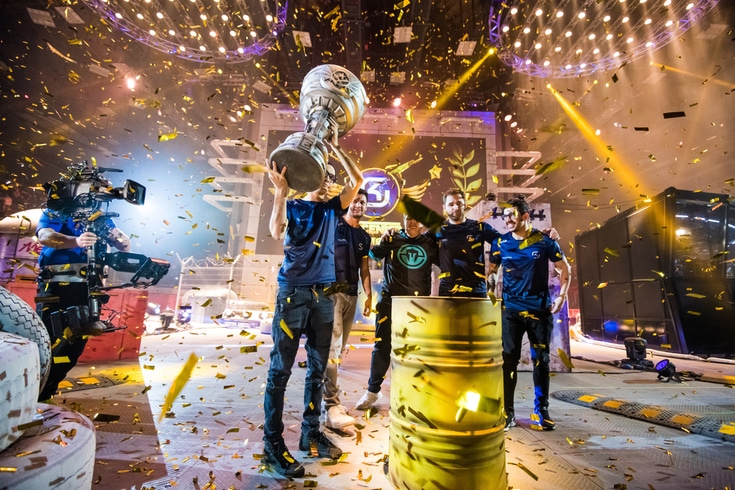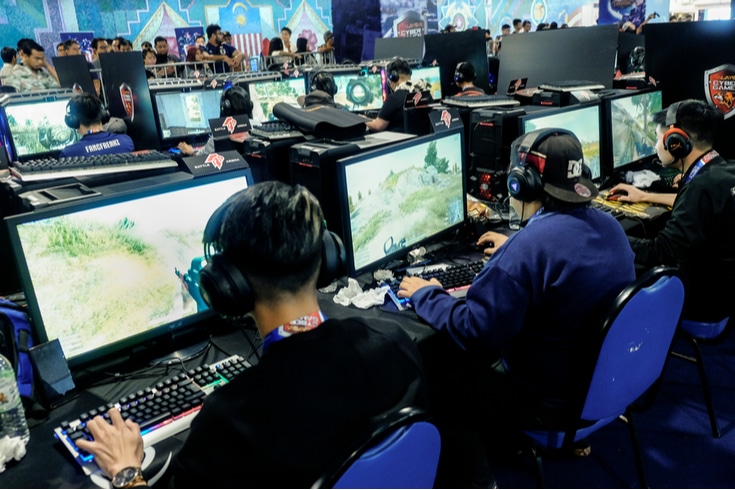What is the Relationship Between eSports Tournaments and the 'Japanese Prize Display Act'? Points for Tournament Organizers to Note

In the so-called e-Sports, or competitive video gaming, there are cases where the ‘Japanese Act against Unjustifiable Premiums and Misleading Representations’ becomes an issue when companies host tournaments. To state the conclusion first, in tournaments targeting both professionals and amateurs, if the company in the position of the manufacturer who released the game title that is the subject of the competition, for example, Capcom in the case of Street Fighter 5, and Nintendo in the case of Smash Brothers, hosts the tournament, if certain conditions are met, setting the prize money to more than 100,000 yen will result in a violation of the Act against Unjustifiable Premiums and Misleading Representations.
I will explain what the Japanese Act against Unjustifiable Premiums and Misleading Representations is, and in what cases tournaments that offer prize money of more than 100,000 yen are legal, and in what cases they are illegal.
※There was a typographical error in the description of the 2016 Consumer Affairs Agency notification in 3.1, and it has been corrected. Thank you to those who pointed it out. (December 24, 2020 (Gregorian calendar year))
What is the “Japanese Premiums and Representations Act”?
Overview of the Japanese Premiums and Representations Act
The Japanese Premiums and Representations Act, officially known as the “Act against Unjustifiable Premiums and Misleading Representations,” is also commonly referred to as the “Premiums Act.” Simply put, this law prohibits:
- Offering excessively high premiums
- Engaging in exaggerated advertising
for the purpose of promoting sales of prizes.
Prohibition of Excessively High Premiums
The issue that becomes problematic in relation to hosting game tournaments is the former, namely the prohibition of “offering excessively high premiums.” For more details on the latter, please refer to the article below.
https://monolith.law/corporate/stealth-marketing-youtuber[ja]
The prohibition of “excessively high premiums” typically envisages, for example, sweepstakes targeting purchasers of sweets. To give an extreme example, if a campaign is run for a 100 yen sweet that says, “Participate in the sweepstakes using the entry ticket inside the package, and if you win first prize, you’ll get 1 million yen!” this could escalate competition through excessive prizes and winnings, leading manufacturers to focus less on competition through the product itself, potentially disadvantaging consumers. The Premiums Act regulates such campaigns using sweepstakes, and as a conclusion, sets the maximum amount of premiums, including winnings and sweepstakes, at:
- Up to 20 times the transaction value if the transaction value of the product is less than 5,000 yen
- Up to 100,000 yen if the transaction value of the product is 5,000 yen or more
.
https://monolith.law/corporate/high-cashback-illegal[ja]
Distinguishing between “Premiums” and “Work Compensation”
However, what is conceived as similar but different from these “premiums” is “work compensation.” This point will also be an issue with the prize money for e-sports tournaments, so I will explain it first.
For example, if a candy manufacturer asks some purchasers for a detailed report on the taste and ease of eating, etc., to help with product development, this is not something that escalates competition through excessive prizes, but is a pure corporate effort. If it is decided that “since the regular price of the candy is 10 yen, the reward for reporting should be less than 200 yen,” it will become difficult to collect detailed and meaningful reports.
The Premiums and Representations Act, in its operational standards, conceives of the above-mentioned “work compensation” and stipulates that “such things are not premiums, so they do not have to comply with the above-mentioned maximum amount regulations.”
eSports Tournaments and the Japanese Prize Labeling Act
Can’t Win Without ‘Grinding’?

The reason why the Japanese Prize Labeling Act becomes an issue in relation to eSports tournaments is due to the suspicion that the prize money of these tournaments might be considered as ‘prizes’ based on the purchase of the video game title that is the subject of the tournament.
In other words, considering the premise of advancing and winning in eSports tournaments to get the prize money, including not only console games like Capcom’s Street Fighter 5 and Nintendo’s Smash Brothers but also mobile games, the following assumptions exist:
- Abstractly speaking, it’s not impossible for someone who has never played the title to casually participate in the tournament, win, and earn prize money.
- However, as it’s clear from being treated as a type of sports competition, especially in modern games, if you don’t purchase the game and ‘grind’, you realistically can’t win.
- Furthermore, in console games, there are often additional charges for elements other than the game itself, such as so-called DLC (downloadable content, additional personalitys, etc.), and in mobile games, so-called ‘gacha’, which are necessary for ‘grinding’.
Is eSports Tournament Prize Money a ‘Prize’?
Considering these premises, the prize money in eSports tournaments could be seen as a kind of ‘prize’ provided by the manufacturer who released the game title in question to the winners (some purchasers), associated with the purchase of the game title that is the subject of the tournament.
In fact, the term ‘prizes’ under the Japanese Prize Labeling Act is interpreted quite broadly, as per the following clause:
Japanese Prize Labeling Act Article 2, Paragraph 2, Item 3
In this Act, ‘prizes’ refer to goods, money, or other economic benefits provided by a business operator in conjunction with the transaction of goods or services they supply (including real estate transactions) as a means to attract customers, regardless of whether the method is direct or indirect, or whether it is by lottery, designated by the Prime Minister.
Does the Prize Money for eSports Tournaments Fall Under ‘Premiums’?
The Consumer Affairs Agency’s View in 2016
In fact, as of 2016, the Consumer Affairs Agency expressed the view that prize money falls under ‘premiums’ under the Japanese ‘Premiums and Representations Act’ in its response to the pre-confirmation procedure for the application of laws and regulations to the International Casino Institute Co., Ltd.
The action game with the ability to compete between different cabinets via the network, used for prize-winning tournaments (hereinafter referred to as “this project”), is a tournament related to the action game specifically planned to be supplied to general consumers as a means to attract customers, and provides prize money, which is an ‘economic benefit’, to the excellent performers in the tournament.
https://www.caa.go.jp/law/nal/pdf/info_nal_160909_0005.pdf[ja]
(Omitted)
In order to improve skills in this action game, it is necessary to play the game repeatedly in principle, so it is considered that the possibility of non-paying users winning prize money as excellent performers is low.
(Omitted)
Considering this, this project is a project where paying users can or easily receive the provision of economic benefits called prize money, and the prize money provided to the excellent performers in this project is considered to be a provision associated with the transaction.
The ‘Response to the Pre-Confirmation Procedure for the Application of Laws and Regulations’ is a response issued by the administrative side in a procedure where private companies, etc., ask administrative agencies in advance for confirmation of the legality of the business activities they are about to undertake.
Is it Illegal for Game Makers to Offer High Prize Money?

Although the administrative response in this procedure is not necessarily the ‘final answer on legal interpretation’, in practice, if the administration gives the above response and the tournament is held ignoring it, there is a risk of being cracked down on. In this sense, this response had practical binding force.
However, the view of this response is, in practice, a ‘problem’. The reason is that:
- When a game maker sponsors an eSports tournament → The prize money falls under ‘premiums’ under the Premiums and Representations Act, so the maximum prize money is 100,000 yen
- When other companies, etc., sponsor an eSports tournament → ‘Premiums’ are originally related to their own products, and in this case, the prize money cannot fall under ‘premiums’, so there is no regulation
This leads to the conclusion that ‘only the sponsorship of eSports tournaments related to their own titles has a small prize money’. This would be a headache for game makers who want to hype up their own titles through eSports tournaments and create professionals.
Consumer Affairs Agency Revises Its View, Making It Principally Legal
The Consumer Affairs Agency’s View in 2019
However, in 2019, the Consumer Affairs Agency (Japanese Consumer Affairs Agency) gave a response that could be interpreted as a revision of its previous view, in response to the procedure carried out by jesu (Japanese esports union).
Firstly, this response is based on the premise that esports tournaments are distinguished by whether they are professional or amateur. In other words,
- Esports tournaments that limit the provision of prize money to players who have been granted a professional license
- Esports tournaments that do not distinguish between professionals and amateurs in terms of who receives the prize money, but limit participants in a certain way and provide prize money according to performance
This is the distinction. It’s a bit difficult to understand, but
- Esports tournaments where both professionals and amateurs participate, but only professionals can win prize money
- Esports tournaments where both professionals and amateurs participate, and both can win prize money (it’s okay to limit participants regardless of whether they are professional or amateur)
These are the two categories.
Prize Money in Esports Tournaments is “Payment for Work”
On this basis, the response first mentions that for professionals, their professionalism, competitiveness, entertainment value, and sportsmanship are typically guaranteed. It also emphasizes that in tournaments where both professionals and amateurs participate, performances using high-level skills and techniques are expected to be shown to a large number of spectators and viewers as part of the job.
On this basis, it concluded that unless there are other facts that could be considered as evading the purpose of the restrictions on prizes under the Act against Unjustifiable Premiums and Misleading Representations (Japanese Act against Unjustifiable Premiums and Misleading Representations), prize money exceeding 100,000 yen is legal in both types of tournaments.
In this case, the players who have the potential to receive prize money are expected to perform attractive performances similar to actual gameplay or demonstrations using high-level skills as part of their job, and show them to a large number of spectators and viewers to enhance the competitiveness and entertainment value of the store, tournament, etc.
https://www.caa.go.jp/law/nal/pdf/info_nal_190903_0002.pdf[ja]
(Omitted)
The provision of prize money to participants (omitted) unless there are other facts that could be considered as evading the purpose of the restrictions on prizes under the Act against Unjustifiable Premiums and Misleading Representations (omitted) is considered to be “provision of money or goods as payment for work”, and (omitted) is not subject to Article 4 of the Act against Unjustifiable Premiums and Misleading Representations.
What are the cases that become illegal as “Evasion of the Purpose of Restrictions”?
Interpretation of the Consumer Affairs Agency’s response by jesu
However, as mentioned above, the Consumer Affairs Agency has added a reservation that “unless there is a separate factual relationship that can be considered as evasion of the purpose of restrictions on prizes in the Japanese Premiums and Representations Act”. It is still unclear what kind of cases this refers to, but the Japan Esports Union (jesu), which made two inquiries in 2016 and 2019, has expressed the view that “providing prizes solely for the promotion of games” could be illegal.
However, in events and tournaments where neither broadcasting nor spectating takes place, and where the nature of the event is not recognized as entertainment, if high-value prizes are provided that do not correspond to the participants’ skills or the appeal of gameplay, and prizes are provided solely for the promotion of games, it should be noted that there is a possibility that the provision of such prizes may not be recognized as “compensation for work” and will be judged on a case-by-case basis.
Report on the status of efforts to address legal issues related to esports[ja]
The above view, analytically speaking, focuses on the following two conditions:
- Neither broadcasting nor spectating takes place, and the nature of the event is not recognized as entertainment
- Providing high-value prizes that do not correspond to the participants’ skills or the appeal of gameplay
It can be said that in such cases, it is suggested that prizes may be provided “solely for the promotion of games”.
Relationship with the Purpose of the Japanese Premiums and Representations Act
The above view is considered to be based on the fact that the Japanese Premiums and Representations Act is intended to prevent a negative chain of events such as:
- Escalation of competition due to excessive prizes
- Manufacturers no longer focusing on competition through the product (game content) itself
- Disadvantage to consumers
In short, it can be said that the purpose of the Japanese Premiums and Representations Act is to regulate the amount of prize money in esports tournaments in relation to (only) the possibility that a game with no content may be created, where one might be able to get disproportionately high prize money by purchasing the game and “playing it thoroughly”. However, this is only in exceptional cases.
Summary
As such, the current consensus is that the prize money for e-sports tournaments, whether they are aimed at professionals or amateurs, is essentially unlimited, except for the exceptional cases mentioned above. Furthermore, for e-sports tournaments organized by companies other than the manufacturers who released the game titles in question, the organizers do not receive any profits from the game itself or from DLCs, gacha, etc., and there is no “transactional nature” to begin with, so there is no potential issue with the regulations on prizes under the Japanese Act against Unjustifiable Premiums and Misleading Representations.
However, there are three major points to be aware of:
- As mentioned above, in certain cases it can become illegal, so it is necessary to determine whether or not your case falls into this category.
- Furthermore, while all of these interpretations are made by the Consumer Affairs Agency, the final decision on whether an action is legal or not is made by the judiciary (ultimately the Supreme Court), not the administration. The “pre-confirmation procedure for the application of laws and regulations” is merely a statement of the administration’s view, and it does not bind the judiciary. And it is unknown whether the judiciary will make the same decision.
- While this article does not go into detail, there may also be issues with gambling offenses in relation to the prize money for e-sports tournaments.
Setting the prize money for e-sports tournaments is a complex legal issue, regardless of whether the tournament is aimed at professionals or amateurs. Especially when organizing a game title with new features or an e-sports tournament with new features, it would be best to consult with a law firm that is familiar with these issues in advance.







![[April 2023] Strengthening the Prohibition of](https://monolith.law/en/wp-content/uploads/sites/6/2026/01/a9e0aa1f810f4f4d3f23e1b55cd8b7bf.webp)













